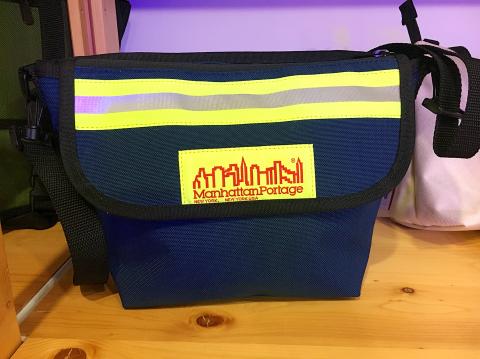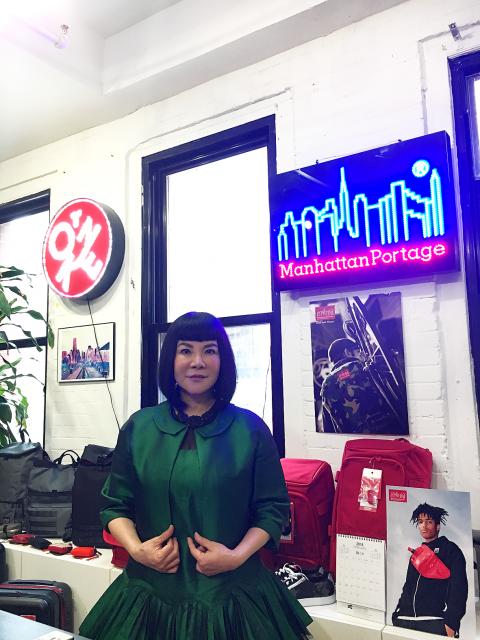During the 1980s, while Manhattan Portage was earning its street cred in the gritty Big Apple as the go-to bag for bicycle messengers, Lin Su-hwei (林淑惠) was thousands of miles away in Taiwan.
What Lin didn’t know at the time was that more than two decades later, she would own the trademark known for its bright red rectangle and image of the New York City skyline — a symbol emblazoned on Manhattan Portage goods sold worldwide, including in Taiwan.
The brand celebrates its 35th anniversary this year.

Photo: Chris Fuchs
“The art of business is not the money,” Lin, CEO of Portage World-Wide, said in a recent interview at the company’s headquarters in SoHo. “It’s kind of like you create something which does not exist and you make it exist. This is the beauty and happiness [of it].”
BORN TO DO BUSINESS
Lin is one of six children born into a family in Kaohsiung with a knack for business. Her parents owned and ran a pharmaceutical factory, manufacturing, distributing and importing medicine. They also had a store.

Photo: Chris Fuchs
Lin studied international business and tourism in college in Taiwan and traveled to Japan for graduate school. But it was a trip to New York City in the 1990s with US$3,000 in cash that really got things started.
“I decided to go outside the country to challenge myself,” Lin said.
At first, she worked for a friend who owned a design company called Token, which sold jewelry. Her English limited, Lin peddled the goods in Koreatown in Manhattan, offering buyers a better price by insisting they pay in cash only.
But eking out a living proved tough, Lin said, as some customers tried to take advantage of her being a newbie.
“Every night I cried.”
A phone call home set her straight. “My mother said, ‘Su-hwei, don’t think this way. Life is like a marathon, and if you don’t run until the end, you don’t know who the real winner is.’”
Then came a request from a Japanese friend — Lin was asked to help find a messenger bag.
Without the convenience of today’s Internet, Lin conducted her search the old-fashioned way, by stopping bicycle messengers on the streets of Manhattan. They, in turn, directed her to Manhattan Portage.
Lin ended up buying Token in 1996, using that company to export Manhattan Portage bags to Asia.
Through a mutual friend, Lin said she also got to meet the founder of Manhattan Portage in 1998, and the two became partners. Lin established Portage World-Wide to handle retail, wholesale and international sales, and opened a retail store that year in the East Village of Manhattan.
Lin worked virtually seven days a week for eight years, manning the counter and interacting with customers, despite what she said were her poor English skills. She recalled having to sometimes resort to body language to communicate.
OBSTACLES
There were other obstacles too. In the early 2000s, armed robbers targeted her shop. And in Japan, someone had already registered the Manhattan Portage trademark, thus preventing the bags from being sold in that country.
A plane trip to the American embassy in Tokyo and a lawsuit helped get the trademark returned in 2006.
That was also the same year Lin bought the Manhattan Portage trademark and became the sole shareholder of Portage World-Wide.
Lin has since closed the East Village shop, operating just one now on Elizabeth Street in Manhattan. The company also has a higher-end sister line called Token.
NEW ERA
One of the biggest differences today, Lin said, is that the Manhattan Portage label has more of a global presence than before, with goods sold in over 40 countries.
She also noted how digital consumerism has spurred change, as customers increasingly prefer to use the Internet for purchases. Portage World-Wide maintains a social media presence, such as on Facebook and Instagram, and features separate Web sites for China, Taiwan and Japan, among others.
Lin declined to discuss the company’s finances, including questions about sales revenue and volume. She did say its financials are very strong.
“I believe many people are watching this brand right now, so I don’t like to say anything,” Lin said, adding that she knows people want to buy her business.
“This company is like a baby for me.”
Portage World-Wide has around 25 employees and makes its bags in Taiwan. One custom at her headquarters is to have everyone sit down together for lunch. Conscious of just how expensive food can be in SoHo, Lin said sometimes she’ll cook for the gathering. (Recently she made a pasta dish with Italian sausage.) Other times, she’ll order out.
This bonding time helps build a strong team and break down barriers.
“When you have one chopstick, it’s very easy to break,” she said. “But when you have 10 chopsticks together, you cannot break them. This is the strength of teamwork.”

The primaries for this year’s nine-in-one local elections in November began early in this election cycle, starting last autumn. The local press has been full of tales of intrigue, betrayal, infighting and drama going back to the summer of 2024. This is not widely covered in the English-language press, and the nine-in-one elections are not well understood. The nine-in-one elections refer to the nine levels of local governments that go to the ballot, from the neighborhood and village borough chief level on up to the city mayor and county commissioner level. The main focus is on the 22 special municipality

The People’s Republic of China (PRC) invaded Vietnam in 1979, following a year of increasingly tense relations between the two states. Beijing viewed Vietnam’s close relations with Soviet Russia as a threat. One of the pretexts it used was the alleged mistreatment of the ethnic Chinese in Vietnam. Tension between the ethnic Chinese and governments in Vietnam had been ongoing for decades. The French used to play off the Vietnamese against the Chinese as a divide-and-rule strategy. The Saigon government in 1956 compelled all Vietnam-born Chinese to adopt Vietnamese citizenship. It also banned them from 11 trades they had previously

In the 2010s, the Communist Party of China (CCP) began cracking down on Christian churches. Media reports said at the time that various versions of Protestant Christianity were likely the fastest growing religions in the People’s Republic of China (PRC). The crackdown was part of a campaign that in turn was part of a larger movement to bring religion under party control. For the Protestant churches, “the government’s aim has been to force all churches into the state-controlled organization,” according to a 2023 article in Christianity Today. That piece was centered on Wang Yi (王怡), the fiery, charismatic pastor of the

Hsu Pu-liao (許不了) never lived to see the premiere of his most successful film, The Clown and the Swan (小丑與天鵝, 1985). The movie, which starred Hsu, the “Taiwanese Charlie Chaplin,” outgrossed Jackie Chan’s Heart of Dragon (龍的心), earning NT$9.2 million at the local box office. Forty years after its premiere, the film has become the Taiwan Film and Audiovisual Institute’s (TFAI) 100th restoration. “It is the only one of Hsu’s films whose original negative survived,” says director Kevin Chu (朱延平), one of Taiwan’s most commercially successful